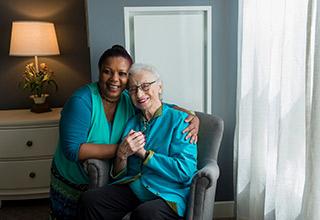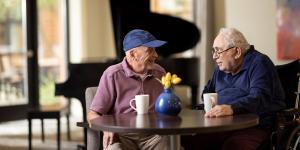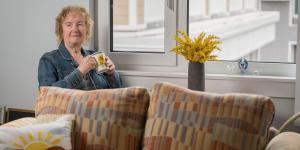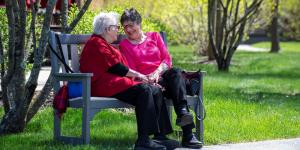How to Get a Good Night’s Sleep
Sleeping well can become more difficult as we get older, but insomnia isn’t inevitable.
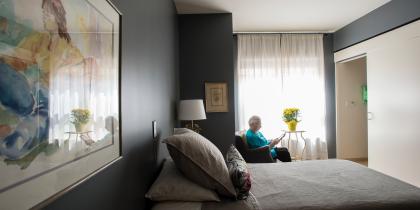
If you have trouble sleeping, you’re not alone. According to the American Sleep Association, about 50-70 million adults in the U.S. have a sleep disorder. And it is a myth that older adults need less sleep than their younger counterparts. In fact, all adults need about seven to nine hours, though as we age, we tend to sleep more lightly and in shorter spurts.
Left untreated, sleep deprivation can become a serious problem, especially among older adults. Consequences may include: impaired cognition; depression, anxiety, or other mental illnesses; reliance on substances to get to sleep; increased risk of falls or other accidents; weight gain; impaired immune system; and difficulty with activities of daily living.
When does poor sleep become insomnia?
According to the Diagnostic and Statistical Manual of Mental Disorders, insomnia is the most common sleep disorder, with 10 percent of the population meeting criteria for chronic impairment, and the prevalence increases with age. Insomnia is defined as dissatisfaction with sleep quantity or quality, associated with one or more of the following symptoms:
- Difficulty initiating sleep
- Difficulty maintaining sleep, characterized by frequent awakenings or problems returning to sleep after awakenings
- Early-morning awakening with inability to return to sleep
The gist is that insomnia becomes a problem when it’s happening often, it’s disturbing some part of your life, and isn’t better explained by some other problem that you’re experiencing.
Why some seniors experience insomnia
So why do seniors report difficulty going or staying asleep? Factors can include:
- Depression, anxiety, and other mental health problems
- Grief
- Medications
- Pain and medical illnesses such as arthritis, Parkinson’s disease, and restless leg syndrome
- The need to urinate frequently
- Substance use
- Dementia
- Living in institutional settings
Add to that the anxiety many people feel about the current COVID-19 pandemic, and you can see why falling asleep can be elusive for many older people.
Tips to sleep better
If all of this sounds hopeless, don’t despair! There are many research-based sleep hygiene strategies that can promote a healthy sleep cycle. Here are some suggestions that you can try at home to see if they help you get a restful sleep:
- Avoid daytime napping.
- Get exposure to natural light during daytime.
- Exercise regularly (but not within two hours of bedtime).
- Maintain a consistent sleep routine and make sure you associate your bed with sleep and sex only - not even reading, doing crossword puzzles, or watching TV in bed. Go to bed only when sleepy.
- Avoid exposure to electronics prior to sleep, including TV.
- Create a comfortable environment: cool room temperature, a comfortable mattress, and limit sounds and light.
- If you tend to get frustrated about the time that has passed while lying awake, turn your clock around.
- No caffeine within six hours of sleep; no alcohol within three hours of sleep; no heavy or spicy meals prior to sleep (but don’t go to bed hungry); and limit fluids before bed.
- Establish a “worry time.” If worries keep you up at night, set an intentional time at some point during the day where you focus on the things you’re concerned about – maybe even writing down a to-do list – and when that time is up set it aside and allow yourself to start that sleep routine.
- Explore meditation techniques and relaxation exercises, such as guided imagery, diaphragmatic breathing, and progressive muscle relaxation. There are apps available to help guide you in relaxation techniques.
If these tips are unsuccessful, you may benefit from some professional help. Your primary care physician can recommend options available to help you get a good night’s sleep. If your insomnia is caused by anxiety or depression, it may be helpful to talk to a mental health professional. Whatever the cause, you don’t have to accept poor sleep as an inevitable part of the aging process.
Blog Topics
Learn More
Wolk Center for Memory Health
The Deanna and Sidney Wolk Center for Memory Health at Hebrew SeniorLife provides outpatient memory care services, in person and virtually, for people living with cognitive symptoms — and for their families and caregivers.
